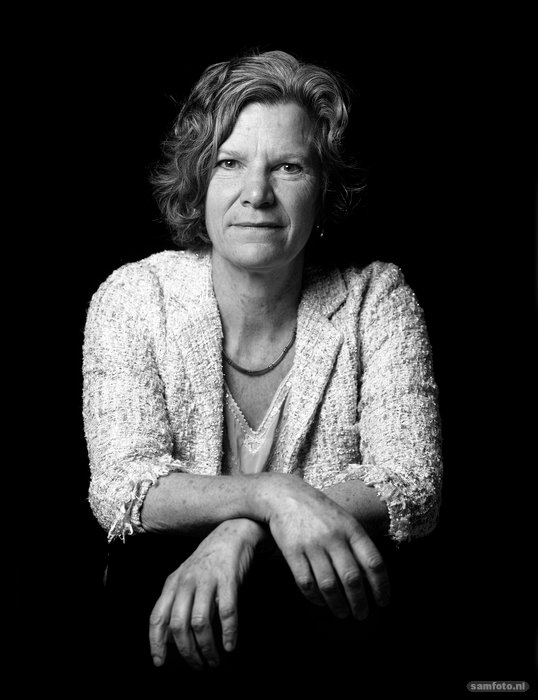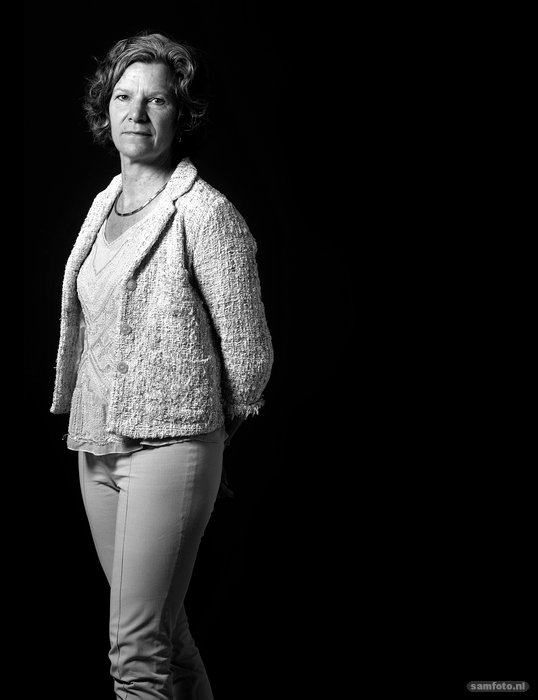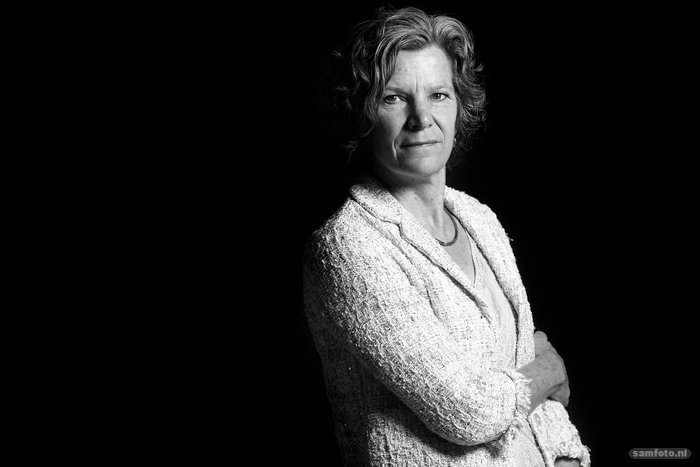‘I want to bring the worlds of sustainability and finance together’
Karin Sluis, senior consultant and former director of Witteveen+Bos, has been voted TU Delft alumnus of the year 2021. What is her vision of talent development, the role of the engineer and the great challenges facing society? “Diversity gives you strength and makes you better,” she says.
Congratulations! You were voted alumnus of the year. Did you see that coming?
“It was a complete surprise! I was on holiday, briefly browsing through my mail. Then I saw a message from Rector Magnificus Tim van der Hagen. I had heard of the title, and of the walk of fame. I am delighted that I will be included. TU Delft, and certainly civil engineering, are dear to my heart.”How did you end up in Delft?
“My children have to laugh when I tell that story. It’s like this: as a teenager, I had a poster of the Golden Gate Bridge in San Francisco above my bed. It was given to me for my fourteenth birthday by my father, also a TU Delft engineer. Looking at the poster, I thought: ‘That’s what I want to do: build bridges!’ For me, the Golden Gate Bridge is the ultimate symbol of the work of civil engineers: making useful, durable and beautiful things. It’s useful, because over 100,000 vehicles pass over it every day. It’s durable, because it opened in 1937, so it has been around for a long time. It’s beautiful, because more than ten million tourists come to admire it annually, twice as many visitors as the Efteling theme park gets. I also wanted to make useful, durable and beautiful things, so I started at TU Delft in 1983. Incidentally, I only visited the bridge myself just a few years ago.”
We actually planned to avoid the subject of women and glass ceilings, but... When you started in 1983, were you one of the few women?
“There were just a couple. There are more today. I see that reflected at Witteveen+Bos, where I have been working for 32 years. I recently saw an organisation chart from around 1990. There were almost no women in the company. Toady a third of my colleagues are women. And there are more and more female engineers.”
How did your career begin?
“During my studies, I did an internship at a small engineering firm in Portugal. I really enjoyed it. There I combined scientific thinking with a commercial environment. My graduation research in a Shell laboratory in Rijswijk was quite theoretical. That’s when I decided I would rather join an engineering firm. It was difficult to find a job in those days, but I wrote to three firms and was invited for an interview at all three. Two said: “We will keep you on our files, and if we have something you'll hear from us.’ The third firm, Witteveen+Bos, said: ‘We think you fit our company. We would like to offer you a one-year contract and if we have not found a position for you after that time your contract will end.’ I’m still working there!”
How does the company deal with young talent today?
“The company is more well known for talent development than when I started. We pay a lot of attention to facilitating employee education, Each year we have about 300 students doing internships and graduation projects, including from TU Delft. The students bring new knowledge and fresh energy to our company, which is inspiring.”
How has your work changed in recent decades?
“Witteveen+Bos is 75 years old. You can see societal challenges reflected in all phases of the business. Witteveen+Bos was established in 1946 and focused mainly on reconstruction projects following the Second World War. In the 1960s, the first environmental issues were recognised and we worked on the first wastewater treatment plants. The themes of the last ten years have been the energy transition, climate adaptation, water management, healthy cities and circular construction. These are all fully in line with the United Nations’ Sustainable Development Goals of 2015, all things we were not concerned with 30 years ago.
In line with this, the way we cooperate has also changed enormously. Before, an engineer would do ‘what he thought was good for you’, but now engineers cooperate much more with ecologists, spatial planners, sociologists and end users. As an engineering firm today, we are really part of society, working with society to find solutions. If we want to work on a road through a city, we talk to the residents and businesses first. If we need to strengthen a dyke, we work together with anglers. Working together leads to better solutions. Diversity gives you strength and makes you better.”
When did you discover that?
“When I started as director in 2013, I visited a conference of European engineering firms. I came back with three goals: sustainability, digital transition and diversity. The message of the conference was that a company has to have its own vision of those three goals to be successful in the long run.”
How does diversity manifest in your company?
“We believe that we come up with better solutions when we look at a problem from different angles. So we ensure we build diverse project teams. We also believe that everyone deserves the same opportunities. Our appointment procedures are open to everyone and we have made agreements concerning languages. We have learned that, though it takes time and energy to understand each other, in the end it leads to a finer company that offers better solutions and where you can learn more.”
In 2018, you were named ‘CEO of the year’ among European engineering firms. You were hailed for attracting young people to the company and increasing the profit margin.
“We have put extra energy into reaching young people, but not necessarily only to achieve more growth. Growth and profitability are the results of what you do, not goals in themselves. I wanted our company to help find solutions to major societal challenges. The United Nations’ sustainable development goals tell us what challenges we are facing as a world. There are seventeen goals and more than half are things that involve us as engineers, such as the energy transition, sustainable production, cities, water, etc. With four thousand projects a year, we can contribute greatly to those goals.”
What ties do you have with TU Delft?
“For an engineering firm to come up with good solutions, you have to stay up to date with the latest knowledge. TU Delft provides some of that knowledge. I keep in touch with various professors and the dean, so that we can keep up with the latest knowledge and apply it in practice.”
You are no longer a director, but a consultant. Why?
“The articles of association of Witteveen+Bos state that you have to step down as director when you reach the age of 55. I am often asked why that is. The idea behind it is that you can contribute to the further development of the business in another position. I am happy to deploy my knowledge and experience for a better future, without the responsibilities of a director.
This age rule allowed me to sit on the Council for the Environment and Infrastructure. It's not about prestige; I'm more interested in having a council of experts that advises the government about our environment and infrastructure. It is important that engineers contribute to these ‘clubs’, or more correctly, public bodies. After all, it involves our field of specialisation, and I'm keen to have a say.”
What topics do you want to see on the agenda of the Council for the Environment and Infrastructure?
“I provided support to the ‘Reviewing nature policy’ project. The loss of biodiversity really concerns me. If we can increase biodiversity while simultaneously solving the housing crisis, then I would love to contribute to that. The infrastructure also poses a major challenge; many bridges and roads need to be renovated, but how can we make this part of a circular economy and at the same time restore biodiversity?
Major societal challenges such as climate adaptation and biodiversity require lots of money. I have just finished a round of talks with bankers and pension providers. They are really keen to invest in sustainable projects, but they are not enough. My ambition is to bring the worlds of sustainability and finance together, for example with a project that combines nature reserves with renewable energy. There must be a business case: decent pensions must go hand in hand with a real contribution to sustainability. Only then will it really be sustainable.”
CV
Karin Sluis studied civil engineering in Delft and specialised in hydraulic engineering. After graduating in 1989, she joined Witteveen+Bos as an urban water management specialist. Over the years, she has held various managerial positions with this international consultancy and engineering firm in the fields of water, infrastructure, environment and construction. In 2013 she was appointed managing director. In keeping with a company rule, she resigned as managing director in the year she turned 55. She is now a senior advisor and closely involved in the company’s strategic development, for example developing sustainable investment portfolios.
In addition to her work at Witteveen+Bos, Sluis was a member of the ‘Top Team’ of the Water & Maritime Top Sector. She is currently a member of the Council for the Environment and Infrastructure, a member of the board of NWO’s Applied and Engineering Sciences domain and a member of the Supervisory Board of Saxion University, among other things.


